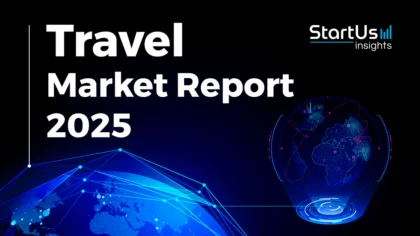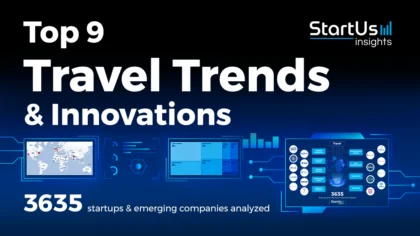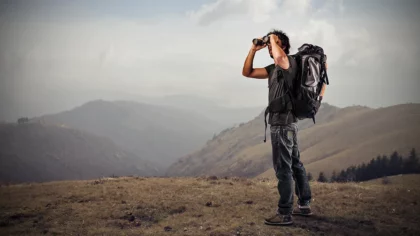The one-fits-all approach has lost its influence in the travel industry. Young people, especially Millennials, prefer a personalized travel experience instead of joining a tourist group. This trend has appeared due to mostly web-based technologies that give people access to a vast quantity of information about their desired destination.
Moreover, mobile technologies, blockchain, and digital payment allow the travel experience to be more flexible and spontaneous. While the market is expanding, with digital travel expected to reach USD 1618 billion by 2032, it has become more challenging for travel service providers to stand out from their competition.
Dive into Our Data-driven Travel Innovation Map
At StartUs Insights, our Innovation Analysts researched more than 1.000 startups to identify future innovation areas that give companies a competitive advantage:
Ready to explore all 1000+ Travel Startups & Scaleups?
Web & App Travel Aggregators
By aggregating thematic offers from different travel providers, such as thematic tours, outdoor activities, luxury travel, and green tourism, a travel aggregator expands support throughout the entire trip. Customers can customize every element of their trip based on individual preferences – all on one platform.
Artificial Intelligence / Conversational Interface
Advanced Artificial Intelligence (AI) enables chatbots to process natural language with ease. Travel agents that implement AI can offer the best experience for their customers. Simple processes such as customer support, order tracking, and content distribution can be automated and tracked for analysis thereby creating customized travel plans and providing a fast and simple communication channel to customers.
Blockchain
Blockchain’s smart ledger system provides secure and private data storage and identification functions for various actors in the travel industry. A blockchain token assigned to each traveler allows travel agencies and airlines to identify customers and to track their belongings in a simple and fast manner. What is more, a more efficient ledger makes resource distribution between actors in the travel industry easier and prevents double booking.
User-Generated Content (UGC)
An overwhelming amount of information is available on the Internet today. User-generated content such as photos and videos provides authentic travel information to travelers looking for their next destination. Besides contributing as an inspiration for wanderlust and increasing trust, user-generated content is an influential way to get in front of new target audiences.
Looking for specific Travel Innovation Trends?
Augmented & Virtual Reality
AR & VR technologies are often used to demonstrate destinations (“try before you fly”), to highlight unique selling points (hotels or destinations), and to boost engagement (one-of-a-kind travel experience). For example, a virtual replication of any tourist attraction can be generated using a 360° camera and LiDAR technology in order to attract potential tourists.
Mobile Payment
Various mobile payment methods, such as peer-to-peer (P2P) payment, digital wallets (eWallets), and cryptocurrencies have become increasingly popular. A travel service provider can seamlessly integrate them into every part of the trip. Thus allowing quick and secure payment so that travelers don’t have to worry about security or foreign exchange rates.
Personalized Travel
More than 85% of travel consumers say personalization has affected their travel purchase decisions. Therefore, understanding individual travel preferences & tailoring travel plans accordingly is crucial to stay ahead of the competition. An individualized trip and a personal guide provide added value to customers and can be potentially used to craft authentic user-generated content.
Mobile Travel
Interaction and communication on mobile devices have become important sales and customer support channels for travel services. From cross-device service to personalized & data-driven search results, integration of travel information, as well as AR/VR apps and wearables, travel apps show advantages in various areas. They allow travel services not only to get feedback in real-time and adapt to customers’ needs but also to generate valuable data for service improvement.
Disruptive Startups In The Travel Industry Include:
- Italian startup Hologys fosters collaboration among all stakeholders in the tourism industry through a decentralized marketplace. Its B2B management software, Iglooms and Hub Voyage, caters to accommodation providers and tourism operators, enabling them to sell products and efficiently manage contacts, promotions, accounting, collections, and payments.
- Net Solutions leverages chatbots to provide a personalized travel experience. The startup’s chatbots can be launched on Messenger, Telegram, and Slack among other services and provide full analytics to better understand customer behavior. The service includes features such as providing customer support, tracking orders, and distributing content.
- UIQ Travel, a US startup, creates a blockchain-powered app that connects solo travelers. By identifying individuals with similar interests, the app recommends personalized tours and attractions, enhancing the overall travel experience and fostering engagement
- Realities is one example of a startup bringing experiences to life. The startup lets travelers explore a library of interesting places all around the globe in photorealistic quality. Currently available for HTC Vive, the images (“scans”) used are based on photogrammetry and other scanning techniques like LiDAR (Light Detecting and Ranging).
- WeTravel developed a platform that collects payments securely while also managing (group) bookings efficiently. The startup allows travel agents to create a booking page that collects downloadable traveler information, and, additionally, collects payments as well as refunds.
- Localscope by Cynapse is a single app containing aggregated information from various sources. The startup lets travelers discover places, people and information about them using geo-tagged data from multiple local search engines, social networks, and media sharing services. The app includes badges for ratings, check-ins, likes and can add geo-tagged reminders for any location.
Explore Emerging Travel Startups & Technologies
The innovation areas we present in the Travel Innovation Map are not exhaustive; green tourism, wearable technology, and biometric data, for example, will also impact the future development of the industry. Companies that act now, seize these opportunities and partner with disruptive startups will emerge as tomorrow’s industry leaders.










